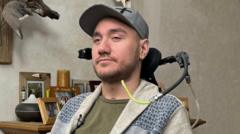In January 2024, 30-year-old Noland Arbaugh became the first person to receive a Neuralink brain chip, designed to translate thoughts into digital commands. This groundbreaking implant, crafted by Elon Musk's neurotech company, offers hope to those with paralysis—a little over eight years post his diving accident that left him paralyzed from the shoulders down. While other neurotechnology companies have developed similar devices, Noland's story garners international attention, partly due to Musk’s high-profile involvement.
Arbaugh expressed awareness of the risks associated with the experimental surgery by stating that, regardless of the outcome, his participation could contribute to advancements in neurology. “Good or bad, I would be helping,” he emphasized. Having lost control of his body and painfully relying on others, he looks towards this technology as a path to regaining independence. The brain-computer interface (BCI) works by detecting electrical impulses from the brain linked to thoughts about movement, enabling users to interact with computers seamlessly.
Upon awakening from surgery, Noland was astonished to find that he could control a computer cursor with his thoughts, an experience he described as surreal, akin to science fiction. Over time, he gained proficiency, managing to play chess and video games again—activities he had to relinquish after becoming handicapped. “Now I’m beating my friends at games, which really shouldn’t be possible but it is,” he proudly noted.
The promising technology's implications are enormous, but experts raise concerns about privacy issues. Anil Seth, a neuroscience professor, warned against the potential risks of having our thoughts accessible to external sources. However, as Noland sees it, the benefits of advanced applications could be significant—he dreams of controlling a wheelchair or a humanoid robot in the future.
Despite some challenges, including temporary disconnection from his device, Noland remains optimistic about the possibilities of his Neuralink implant. As he participates in a six-year study of the chip's effects, he believes this technology could fundamentally alter lives in the future, transforming how we understand and interact with the brain. “We know so little about the brain, and this is allowing us to learn so much more,” he concluded, hinting at a bright horizon for neurotechnology advancements.

















